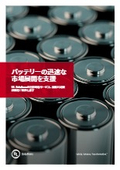Information on Battery-Related Services
We continue to work on the evolution of battery safety science.
UL has been a global leader in battery safety science, issuing its first lithium battery standard 30 years ago. Since then, the size, types, energy density, and applications of batteries have significantly expanded. In response to these rapid technological advancements, UL continues to address the evolution of battery safety science through in-depth research activities, standard development, and certification testing necessary for establishing trust and entering the global market.
basic information
<UL Battery Evaluation: The Full Scope of Services> ■ Safety Testing/Certification Safety testing and certification that lead to entry into the global market and differentiation. UL has been a leader in safety testing and certification for battery products for over 30 years. ■ Performance Testing/Certification Whether it's benchmarking against competing products in materials, charging/discharging and overcharging tests for cells and battery packs, or environmental and altitude simulations in system integration, UL's performance testing can be utilized at any stage of the value chain. Additionally, battery products certified by UL as meeting the appropriate IEC standards can display the UL performance certification mark. ■ United Nations (UN)/U.S. Department of Transportation Transportation Testing UN/DOT 38.3 is an international standard established to ensure safety during the transportation of lithium batteries. UL has testing facilities around the world to demonstrate compliance with this standard. *For more details, please refer to the catalog.
Price information
For more details, please feel free to contact us. Please also take a look at the PDF materials.
Delivery Time
Applications/Examples of results
<Target Audience> Chemical substance/material manufacturers Cell manufacturers, battery module/pack manufacturers System integrators & OEMs End users & distributors <Content> Research Risk management Training & seminars Environmental performance verification Safety testing/certification Performance testing/certification CSR procurement UL PROSPECTOR database Design review and advisory services UN/DOT testing Separator safety testing EMC testing Functional safety Electric vehicles Field evaluation Forensic analysis
catalog(6)
Download All Catalogs
News about this product(3)
-

Start of evaluation, testing, and report issuance services to comply with UL 4200A under the lease method.
UL Solutions has expanded the capabilities of its Ise headquarters safety testing laboratory to provide services compliant with the lease law for consumer products incorporating button batteries or coin batteries, and has started evaluation, testing, and report issuance services to comply with UL 4200A. Compliance with ANSI/UL 4200A can be demonstrated through a letter report provided by UL Solutions. For details on the regulations that will take effect on March 19, 2024, and information about the services, please refer to the "Related Links" below.
-

UL has newly introduced testing facilities capable of handling high-capacity batteries in Ise City.
UL has made advancements in high-capacity and high-energy density batteries, expanding their applications to e-mobility products such as electric assist bicycles, and contributing to the improvement of safety for these batteries and related products. On April 8, 2021, UL implemented capital investments, including two medium-sized explosion-proof chambers for testing high-capacity batteries at its headquarters in Ise City, Mie Prefecture, and launched comprehensive testing and certification services, including customized testing and reliability testing. In addition to the battery certification services for consumer products that UL has been providing at its Japan location, it will now also be able to handle testing and certification for high-energy density and high-capacity batteries.
-

[Free Online Seminar] Introduction and Overview of Battery-Related Standards
Since its development in the 19th century, batteries have been widely used and have become indispensable in cutting-edge products of the times, such as mobile devices and electric vehicles. While the size, types, and energy densities have diversified, the demand for safe usage of batteries has remained constant. Safety standards have been adopted globally as mechanisms that contribute to the safety of batteries. In this seminar, we will broadly introduce safety standards related to batteries. Focusing on international standards and UL standards, we will provide an overview of each standard and their applications, enabling a comprehensive understanding of the diverse battery standards.
Recommended products
Distributors
**Overview of UL** UL addresses challenges in safety, security, and sustainability through the application of science, contributing to the creation of a better world. By enabling the safe introduction of advanced products and technologies, UL enhances trust. The staff at UL share a passion for making the world a safer place. From third-party research to standards development, testing, certification, and the provision of analysis/digital solutions, UL aims to build a healthier global society through its operations. The trust in UL supports smart decisions made by businesses, manufacturers, government authorities, regulatory agencies, and individuals. For more details, please refer to the website (UL.com). **Overview of UL Japan, Inc.** UL Japan, Inc. was established in 2003 as the Japanese subsidiary of UL, a global third-party safety science organization. Currently, leveraging UL's global network, it provides conformity assessment services for certification marks required for products in the North American UL mark, as well as safety and EMC certification PSE and S marks based on Japan's Electrical Appliance and Material Safety Law, and certification marks needed for the European and Chinese markets.













































